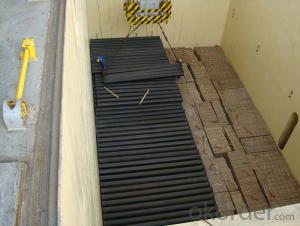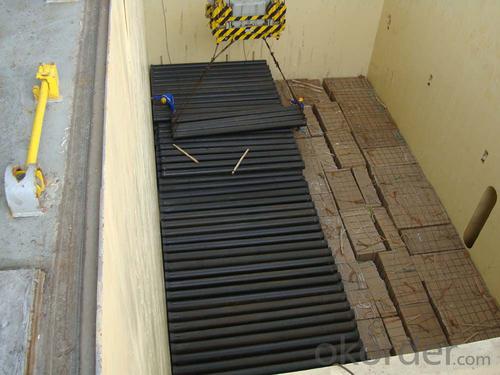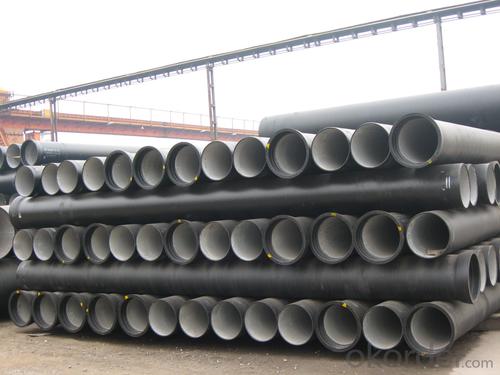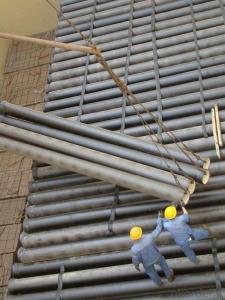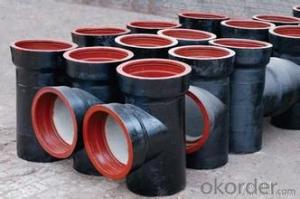DUCTILE IRON PIPE DN900 K9
- Loading Port:
- China Main Port
- Payment Terms:
- TT OR LC
- Min Order Qty:
- -
- Supply Capability:
- -
OKorder Service Pledge
OKorder Financial Service
You Might Also Like
Specification:
1) The standard of pipe: ISO2531:1998, K9
2) Effective length: 6m
3) Inner cement line: Portland cement line as per ISO4179
4) Zinc coating: at least 130g/m2 as per ISO8179
5) Bitumen painting: at least 70um as per ISO8179
6) With 100% quantity of NBR ring, or SBR ring, or EPDM ring as per ISO4633
7) DN80mm-800mm
8) High strength, lighter than grey iron, good corrosion resistance, no furring, small flow resistance, easy fixing, long life tome about 100 yeas
9) Produced by Hangzhou chunfeng machine
10) Checked by automatic inspection equipment
11) Composition:
Chemical composition | | | | |||
Chemical composition | Ductile Cast Iron Pipe (%) | Grey iron pipe (%) | Steel pipe (%) | | | |
C | 3.5-4.0 | 3.2-3.8 | 0.1-0.2 | | | |
Si | 1.9-2.6 | 1.4-2.2 | 0.15-0.4 | | | |
Mn | 0.15-0.45 | 0.4-0.6 | 0.3-0.6 | | | |
P | ≤0.06 | ≤0.3 | 0.02-0.03 | | | |
S | ≤0.02 | ≤0.1 | 0.02-0.03 | | | |
Mg | 0.03-0.06 |
|
| | | |
12) Feature:
Mechanical properties | | | | |||
| Ductile Cast Iron Pipe | Grey Iron Pipe | Steel Pipe | | | |
Tensile Strength(Mpa) | ≥420 | 150-260 | ≥400 | | | |
Yield Strength(Mpa) | ≥300 | No Confirmation | No Confirmation | | | |
Bending Strength(Mpa) | ≥590 | 200-360 | ≥400 | | | |
Elongation (%) | ≥10 | Neglected | ≥18 | | | |
Brinell Hardness(HBS) | ≤230 | ≤230 | About 140 | | | |
13) T type mechanical joint
14) Packing: in bulk or container
- Q: How to choose a ductile cast iron pipe with guaranteed quality
- 1, first of all choose the regular manufacturers of ductile iron pipe products.2, the choice of ductile iron pipe, should be based on the specific circumstances of the construction site, select the pipe and fittings corresponding to the form of interface.3, rubber rings recommend the use of three yuan ethylene propylene rubber ring and so on.4, listen to the voice, knocking the iron: short duration. The iron ball: crisp sound, echo, short duration5, the cutting surface is gray: gray, shiny surface seems very dark, very rough. Ductile iron: gray, gray luster is bright, like gray surface roughness.
- Q: What is the minimum pipe diameter of cast iron pipe?
- Cast iron pipe: cast pipe made of cast iron. Cast iron pipes are used for water supply, drainage and gas transmission lines. They include cast iron pipes and pipe fittings. Labor intensity is small.
- Q: Are ductile iron pipes suitable for irrigation systems in agricultural fields?
- Yes, ductile iron pipes are suitable for irrigation systems in agricultural fields. Ductile iron pipes have excellent strength, durability, and corrosion resistance, making them ideal for carrying water in irrigation systems. They can withstand high pressure and heavy loads, ensuring reliable water supply to agricultural fields for irrigation purposes.
- Q: How do ductile iron pipes handle water velocity?
- Due to their unique mechanical properties, ductile iron pipes are well-suited for managing water velocity. Ductile iron, being a highly durable and strong material, can endure high water velocities without significant damage or deformation. The inherent ductility of the pipe enables it to absorb the energy generated by the flowing water, effectively reducing the risk of pipe failure or bursting. This characteristic makes ductile iron pipes suitable for handling high-pressure water flow, making them an ideal choice in situations where water velocity is a concern. Furthermore, the smooth internal surface of ductile iron pipes promotes efficient water flow and minimizes friction losses. This smoothness reduces resistance encountered by the water as it moves through the pipe, allowing for higher water velocities without compromising the pipe's integrity. Moreover, ductile iron pipes can be manufactured in various sizes and thicknesses, providing customization options based on specific water velocity requirements. This flexibility ensures that ductile iron pipes can effectively manage a wide range of water velocities, from low-flow applications to high-velocity scenarios. In conclusion, ductile iron pipes possess exceptional capabilities when it comes to handling water velocity. Their strength, ductility, and smooth internal surface contribute to their ability to withstand high water velocities without compromising their structural integrity, making them a dependable choice for water distribution systems.
- Q: Can ductile iron pipes be used for underground compressed air systems?
- Underground compressed air systems can utilize ductile iron pipes due to their high strength and durability. These pipes are suitable for various applications, including underground installations, thanks to their corrosion resistance. This is especially important in underground systems where moisture and other environmental factors can cause damage over time. Moreover, ductile iron pipes have the capability to withstand high pressure, making them a dependable choice for compressed air systems. However, it is crucial to ensure proper installation of the pipes, including adequate support and protection, to prevent any damage or leaks. To maintain the longevity and efficiency of the underground compressed air system, regular maintenance and inspection should also be carried out.
- Q: What are the disadvantages of using ductile iron pipe?
- There are several disadvantages associated with using ductile iron pipe. Firstly, one major drawback is its cost. Ductile iron pipe tends to be more expensive than other types of piping materials such as PVC or even traditional cast iron. This can make it less appealing for projects with strict budget constraints. Secondly, ductile iron pipe is relatively heavy compared to other materials. This makes it more difficult to handle and install, requiring specialized equipment and additional labor. The weight can also make it more susceptible to damage during transport and installation. Another disadvantage is its susceptibility to corrosion. While ductile iron is more resistant to corrosion than traditional cast iron, it is still prone to rust and deterioration over time. This can lead to reduced lifespan and potential leaks or pipe failures. Additionally, ductile iron pipe has limited flexibility and is not as resistant to ground movement or settlement. This can result in cracking or breaking of the pipe, especially in areas with unstable soil conditions or seismic activity. Lastly, ductile iron pipe can have a rough interior surface, which can lead to increased friction and reduced flow capacity. This can result in higher pumping costs and decreased efficiency in fluid transportation. Overall, while ductile iron pipe has its advantages, such as its strength and durability, these disadvantages should be carefully considered when choosing the appropriate piping material for a specific project.
- Q: How does the white iron appear in the case of ductile iron?
- The addition of 0.2% SiC in the raw iron water can effectively reduce the chill.
- Q: How much is the working pressure of ductile iron pipe used in water supply pipe and how is MPa determined?
- Upstairs are positive solutions, but now outdoor buried water pipes are using steel wire mesh skeleton, plastic composite pipe instead of ductile iron pipeThe general pressure grades used for water supply pipes are 1.0MPa and 1.6Mpa
- Q: What are the different lining materials available for ductile iron pipe?
- Ductile iron pipes have multiple options for lining materials, which serve to safeguard the pipes from corrosion and prolong their lifespan. Some commonly used lining materials are as follows: 1. Cement Mortar Lining: This lining comprises a layer of cement mortar applied to the inner surface of the pipe. It serves as a durable and smooth barrier against corrosion, making it a popular choice for water and wastewater applications. 2. Polyethylene Encasement: In this method, the pipe is wrapped with a layer of polyethylene film. This lining delivers excellent protection against corrosion and is frequently employed in aggressive soil conditions. 3. Polyurethane Lining: Polyurethane lining is a spray-applied substance that forms a seamless and flexible barrier within the pipe. It offers exceptional resistance to chemicals and abrasion, making it suitable for applications involving aggressive fluids. 4. Epoxy Lining: Epoxy lining is widely chosen for lining ductile iron pipes due to its outstanding resistance to corrosion and chemicals. It is typically applied as a liquid coating that cures to form a protective and smooth layer. 5. Zinc Coating: Zinc coating, also known as galvanizing, involves applying a layer of zinc to the external surface of the pipe. This lining provides corrosion resistance and is commonly utilized in outdoor and exposed applications. These diverse lining materials offer distinct advantages and are selected based on the specific requirements of the application. Factors such as the nature of the transported fluid, environmental conditions, and expected service life play a crucial role in determining the most suitable lining material for ductile iron pipes.
- Q: What is the expected hydraulic performance of ductile iron pipes?
- The expected hydraulic performance of ductile iron pipes is generally very high. Ductile iron pipes have a smooth inner surface that promotes efficient flow of fluids, resulting in low friction losses and high flow rates. They have excellent resistance to corrosion and abrasion, ensuring long-term performance in various water and wastewater applications. Ductile iron pipes also have a high tensile strength, allowing them to withstand high internal and external loads without deformation or failure. This makes them suitable for use in both above-ground and below-ground applications, including water distribution systems, sewage and wastewater transport, industrial piping, and irrigation systems. Furthermore, ductile iron pipes have the ability to adapt to ground movement and settle without breaking, thanks to their flexibility and resilience. This makes them a reliable choice in areas with unstable soil conditions or seismic activity. Overall, the expected hydraulic performance of ductile iron pipes is characterized by efficient flow, minimal pressure losses, durability, and the ability to withstand various external forces. These qualities make them a popular choice for water infrastructure projects, ensuring reliable and efficient transportation of fluids for a long service life.
Send your message to us
DUCTILE IRON PIPE DN900 K9
- Loading Port:
- China Main Port
- Payment Terms:
- TT OR LC
- Min Order Qty:
- -
- Supply Capability:
- -
OKorder Service Pledge
OKorder Financial Service
Similar products
Hot products
Hot Searches
Related keywords
